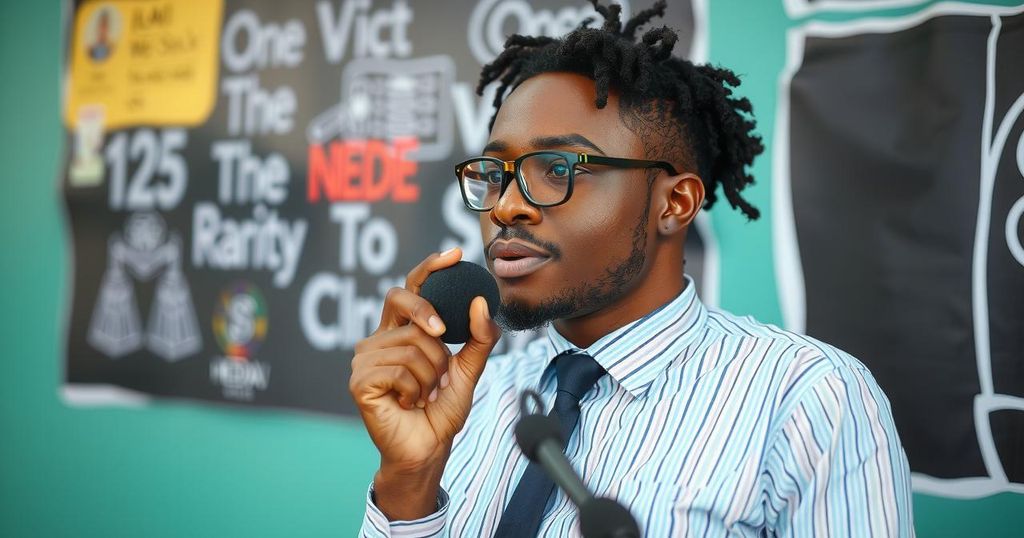Ghana’s Upcoming Elections: A Call for Responsible Journalism
Ghana’s media must prioritize responsible reporting ahead of the December 2024 elections. Journalist John Kamara Taylor emphasizes the need for caution to prevent the temptation for sensationalism, citing the long-lasting effects of war from his experience in Liberia. He advocates for collective support from the region and underscores the importance of women’s representation in political discourse, urging journalists to uphold truth and peace during the electoral process.
In anticipation of Ghana’s 2024 elections set for December 7, there is a rising urgency for responsible journalism to ensure a peaceful electoral process. In a discourse highlighted by Liberian journalist John Kamara Taylor, media professionals are urged to eschew the propagation of divisive narratives that could incite violence. Taylor, who carries the weight of experience from Liberia’s tumultuous past, emphasized the integral role of the media in fostering a peaceful environment during elections, underscoring that war leaves indelible scars across generations.
Taylor’s reflections stem from his own experiences amidst Liberia’s conflicts, which continue to affect societal stability long after conflicts cease. He implored the media to uphold truth and resist sensationalism, positing that responsible reporting is paramount as both domestic and international stakeholders rely on local media for accurate information during elections. He remarked, “If you see things going wrong, intervene lawfully. Also ensure you cross-check every information before putting it out because you cannot afford to make a mistake.”
His insights extended to the need for collective support from the West African region, as he articulated, “When Liberia and other countries were in distress, Ghana helped us, and so we must all encourage them to do what is right in appreciation and also to support them for what they have done for the region over the years.”
Further, Taylor recognized the specific vulnerability of women in war, encouraging their engagement in advocacy for peaceful elections. Amplified by voices in academia, like Dr. Aurelia Ayisi from the University of Ghana, there is a call for media to highlight gender-sensitive issues during elections, ensuring that women’s perspectives and roles in political processes are properly represented and valued.
Dr. Ayisi pointed out the compounded struggles women face during tumultuous times—such as economic instability and personal safety—which necessitate heightened media awareness and responsibility. She asserted, “Journalists must consider the potential consequences of their actions and prioritise the well-being of their audience and especially women and children.”
In conclusion, as Ghana approaches a pivotal moment in its democratic journey, the call for responsible media reporting resonates strongly. The poignant lessons from Liberia’s past serve as a reminder of the immediate need for the media to champion peace rather than sensationalism, ultimately enhancing not only the integrity of the electoral process but also the wellbeing of the populace.
The upcoming elections in Ghana represent a critical juncture for the nation, known for its relatively stable democracy since 1992. After successfully navigating several electoral processes, the imminent 2024 elections evoke a collective anticipation across regions, emphasizing the need for a peaceful electoral climate. The role of the media becomes pivotal, as it not only informs the public but also shapes narratives that can influence the overall atmosphere leading up to and during Elections Day. Reports from regions affected by conflict, such as Liberia, illustrate how irresponsible media coverage can have long-lasting repercussions on societal cohesion and stability, thereby highlighting the need for a vigilant and responsible press.
In summary, the upcoming elections in Ghana underscore the imperative for responsible journalism that prioritizes peace and societal wellbeing. The reflections shared by John Kamara Taylor illuminate the deep responsibilities held by media personnel as they shape public discourse, especially in politically charged environments. Ensuring that narratives foster unity rather than division will be crucial in maintaining Ghana’s democratic integrity and stability, while also uplifting the voices of marginalized groups, particularly women, in the electoral process.
Original Source: www.gbcghanaonline.com




Post Comment